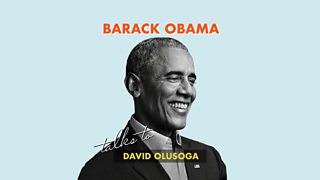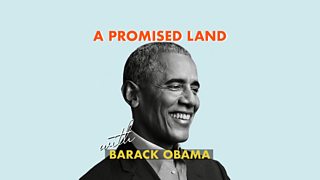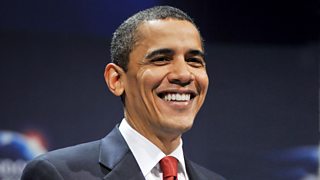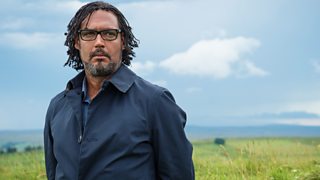Barack Obama: Hope and Perseverance
In a special interview, historian and broadcaster David Olusoga spoke with Barack Obama about his presidency, and his new memoir, A Promised Land. Here are seven things we learned from their conversation.
-
![]()
Listen to: Barack Obama Talks to David Olosuga
Barack Obama discusses the challenges he faced confronting political, cultural and racial divisions in America, as the first African American to hold the nationβs highest office.
1. A Promised Land is about perseverance and hope
A Promised Land is the first volume of Obama’s presidential memories, covering the years leading up to his presidential campaign, and his first four years in office.
Obama is motivated by the notion that “if we are persistent and hopeful, we can make things better. If not for ourselves then certainly for the future.”
He explains that the book’s title is a reference to the story of Moses who led the Israelites out of Egypt. After 40 years of wandering in the desert, Moses died seeing – but never reaching – the Promised Land.
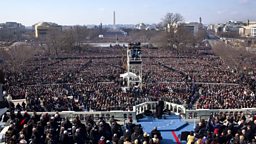
2. He says race is a central fault line in American history
Obama put the final touches to his book this summer, during a time of widespread protest and renewed calls for racial equality and justice.
“A thread running through not just this book, but also my presidency, was the question of race. That's been one of the central fault lines in American history – our original sin.”
As he watched the events of the summer unfold – the killing of George Floyd and the response that followed – Obama felt “a mixture of despair and optimism: despair that the chronic lingering role of race and bias in our criminal justice system continues in such a blatant form; and enormous optimism that you saw an outpouring of protest activism and interest that far exceeded anything we had seen previously, and which was peaceful, thoughtful, well-organised, was multi-racial.”
3. He believes America is a house divided
"We are very divided right now, certainly more than we were when I first ran for office in 2007 and won the presidency in 2008.”
Obama attributes some of that division to socio-economic factors, such as growing inequality, divisions between rural and urban America, and reactions to globalisation. It is a problem he see replicated around the world: “People feeling as if they're losing a grip on the ladder of economic advancement, and so react and can be persuaded that it's this group's fault or that group's fault."
President Trump, he says, fanned the flames of division for political gain.
4. Barack Obama says βtruth decayβ and conspiracy theories havenβt helped
“Conspiracy theories and what some have called ‘truth decay’ have contributed enormously to growing divisions,” Obama tells Olusoga, and warns of the dangers of a lack of fidelity to the truth.
“The pandemic is a classic example of reality biting back.” He adds that ignoring facts about climate change may bring “slow-rolling” but “even more damaging” consequences.
“It's going to take more than one election to reverse those trends,” Obama says. As well as standards and regulations in the industry action, challenging misinformation means changes on getting people to listen to each other and think more critically.
He states that “We must at least recognise a common set of facts before we start arguing about what we should do about those facts.”
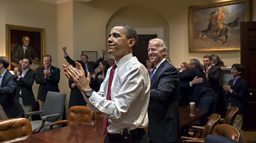
5. With progress comes backlash
Some have argued that Obama’s presidency worsened race relations in the US, but he disagrees. “I was never of the view that somehow my election signified a post-racial America,” says Obama. Instead, his election showed “a change of attitudes” among the majority of Americans. Backlash, he argues, is the “nature of progress.
“The indisputable fact is that the country was better off eight years later than it was when I took office. It also allowed for eight years, children – black, white, Hispanic, Asian, Native American – were growing up learning to take for granted that a black person could occupy the highest office in the land.”
6. He feels young people are more comfortable with difference
Obama finds great hope in the way younger generations think about difference and equality: “They believe what we taught them, and their teachers taught them, even if we didn't believe in ourselves.
“It doesn't matter whether I'm in Johannesburg or Buenos Aires, or Ho Chi Minh City. You've talked to these young people, they share that common attitude,” he tells Olusoga. “The collision of cultures is something they are comfortable with. They are used to music and food and movies and books, and dance moves from every place.”
“I think that the question then becomes, how do we create institutions that reflect this new spirit?” Obama argues that our current institutions have left people feeling uncertain and unmoored. So, we need to create “new institutions that allow us to be inclusive, but also responsive to people's day-to-day lives.”
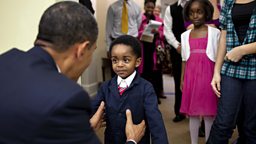
7. He is cautiously optimistic about the future
Although, America is “full of flaws and contradictions”, Obama believes in the possibility of America. “History doesn't move in a straight line – it zig-zags and can go backwards. If you were an African American right after the Civil War during Reconstruction, you might feel pretty optimistic. Fifteen years later, you'd feel very pessimistic, because there was a massive retrenchment.”
Still, the work of abolitionists, the suffragettes, the union movement and, more recently, the LGBTQ movement show “a trajectory in which American democracy becomes more and more inclusive.
“That's part of what A Promised Land is about,” Obama explains. “Wanting young people to cultivate that cautious optimism that the world can change, but you have to be a part of that change.”
You can watch Barack Obama talks to David Olusoga on ΒιΆΉΤΌΕΔ iPlayer or listen to the extended interview on ΒιΆΉΤΌΕΔ Sounds now. You’ll also be able to listen to Barack Obama read from A Promised Land on ΒιΆΉΤΌΕΔ Radio 4 in December. Subscribe on ΒιΆΉΤΌΕΔ Sounds now.
Related Content
-
![]()
A Promised Land by Barack Obama
Book of the Week: Barack Obama gives a stirring and personal account of his first term as 44th president of the United States, a time of dramatic transformation and turmoil.
-
![]()
Making Obama
Jenn White of Chicago public radio station WBEZ analyses Barack Obama's rise to power.
-
![]()
Black and British: A Forgotten History
Historian David Olusoga explores the enduring relationship between Britain and people whose origins lie in Africa.
